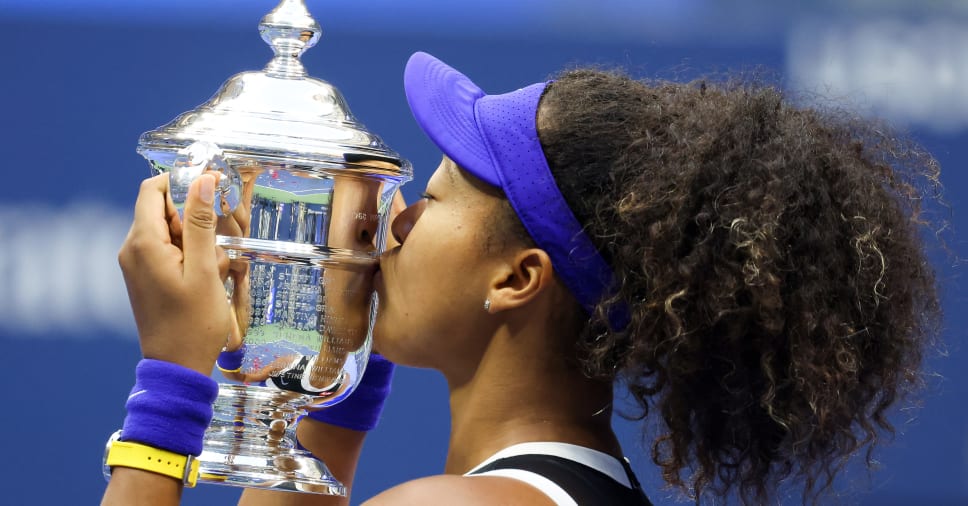
Circumstances at this year's U.S. Open were extraordinary due to the Covid-19 pandemic but rather than getting deterred, champions Naomi Osaka and Dominic Thiem overcame them in order to fulfil their destinies.
Debate raged for months after the United States Tennis Association announced in June that the hardcourt Grand Slam would go ahead in New York, which was once the global epicentre of the novel coronavirus pandemic, albeit without any fans in attendance.
Top men's and women's players raised concerns and expressed doubts over travelling to the United States.
The organisers tried to address their concerns but also continued their preparations for the Grand Slam, putting numerous rules in place designed at mitigating health risks.
One of those was the mandatory use of face mask, which became a tool for Osaka in her activism against racial injustice in the United States.
For each of her seven matches at Flushing Meadows, Osaka walked on to the court wearing a different face mask featuring the name of a Black American who suffered racial injustice in the United States.
The only way she could ensure that the names of Breonna Taylor, Elijah McClain, Ahmaud Arbery, Trayvon Martin, George Floyd, Philando Castile and Tamir Rice were once again etched into public consciousness was by making it to the final.
"I feel like I'm a vessel in order to spread awareness," the two-time U.S. Open winner said. "I do think it's a very big motivating factor for me just to try to get the names out to as many people as I can.
"So I'm not sure if that's giving me extra power."
While Osaka found extra power, Victoria Azarenka showed she still had enough motivation to once again claw her way back to the top echelons of the sport, reaching a Grand Slam final after seven years.
The unseeded Belarusian was also one of nine mothers in the women's singles draw this year and showed exemplary grit during her comeback victory in the semi-finals over 23-times major winner Serena Williams.
The loss, however, prolonged the American's pursuit of Margaret Court's record 24 Grand Slam titles.
The wait for a first slam, however, finally ended for Thiem.
The 27-year-old had lost in three finals - twice to Rafa Nadal at the French Open and once to world number one Novak Djokovic at this year's Australian Open - and for the first two sets on Sunday he seemed like he was heading for another heartache.
LIFE GOAL
But he somehow managed to come back from two-sets and a break down against Alexander Zverev to crawl over the finishing line first to hoist the U.S. Open trophy.
Critics could argue that Thiem's path at Flushing Meadows was without roadblocks as he did not have to face any of the 'Big Three' of men's tennis.
With Nadal opting out due to the pandemic, Roger Federer injured and top seed Djokovic defaulted in the fourth round for hitting a line judge with a ball, the stars seemed to have aligned for Thiem.
The Austrian dutifully took his chance, ending a six-year wait for a new name on a men's Grand Slam trophy and a first winner outside the 'Big Three' since 2016.
"Definitely I achieved a life goal, a dream of myself, which I had for many, many years," said Thiem.
Among its many health measures, the USTA also used automated line-calls at this year's Slam on all but its two biggest show courts to reduce the number of people at Flushing Meadows.
The experiment went smoothly and Djokovic might have wished it had been in use on Arthur Ashe Stadium too because then he would not have been disqualified for hitting a lineswoman accidentally in the throat with a ball.
That was, however, not the only controversy during the last two weeks.
Frenchman Benoit Paire was withdrawn before the tournament started after testing positive for COVID-19. Those who were deemed to have been in close contact with him had to face even stricter measures and were required to take daily virus tests -- rather than every four days as was the norm for everyone else.
Kristina Mladenovic, who was one of them, slammed the protocols and suffered more ignominy when she was pulled from the doubles tournament, where she was the top seed, as health authorities ordered her to go into quarantine.
But once the tournament started, none of the 365 competitors at the U.S. Open tested positive for the virus, underlining the efficacy of the controlled environment.
"On the moments where we perhaps thought it wasn't going to happen, the adversity was there, I remember speaking to Billie (Jean King). She said, 'Stace, remember who you serve,'" Tournament Director Stacey Allaster said.
"We're serving our sport. It's been an unbelievable privilege."





1732351485-0/Untitled-design-(2)1732351485-0-270x192.webp)
1732351930-0/Express-Tribune-(2)1732351930-0-270x192.webp)












COMMENTS
Comments are moderated and generally will be posted if they are on-topic and not abusive.
For more information, please see our Comments FAQ